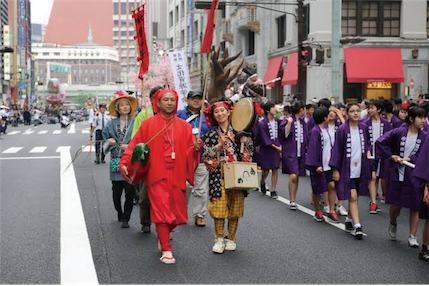KANDA MATSURI*festival EXPERIENCE

A special day to experience Japanese traditional culture passed down since the Edo period through the Kanda festival.
The Kanda Festival, which has continued since the Edo period, is considered one of the three major festivals in Japan. During the Edo period, it was also known as the “Tenka Festival” as it was the only festival that paraded through the castle, and served as a passionate entertainment for the common people.
This tour offers the unique experience of participating in the festival, allowing you to directly feel the excitement and culture of the festival. In addition, you will be able to take part in traditional Japanese cultural activities such as tea ceremony, dance, Japanese cuisine, and prayer in traditional Japanese clothing, providing a unique fun and inspiring experience.
Contens you can experience
Portable Shrine
(Mikoshi)

We hope that you can make many fantastic memories entwined in Japanese culture, a part of which we have been forging for over 1,300 years here at the historic Kanda Myojin Shrine. The portable shrine of the Kanda Festival is a beautiful representation of Japanese traditional culture. Every year people bear this beautifully decorated box and parade it through the shrine, as their powerful voices call out to the heavens in a prayer for protection and abundant harvest. A wonderful and moving display of the faith and bonds that Japanese people feel with their Gods and each other.
Furthermore, the Kanda Festival is a traditional event that has continued since the Edo period and is still loved by many people. The portable shrine of the Kanda Festival not only makes you feel the traditional culture and history of Japan, but also brings a glamorous festive atmosphere. The portable shrine of the Kanda Festival is an important cultural heritage of Japan, and will be a valuable and memorable experience for many people.
Attached Festivals
(Tsukematsuri)

*13th May only
The attached festivals of the Kanda Festival are additional ceremonies that accompany the portable shrine, and are important events that deepen the connection between the shrine and the local community. The attached festivals include rituals and traditional performing arts handed down by the shrine, as well as events related to the culture and history of the region. The entertainment also reflects the trends and fashions of the time. Thus, the attached festivals embody not only the portable shrine, which is the backbone of the Kanda Festival, but also the culture, history, and faith of the local
community, making it an important event for local people. The attached festivals of the Kanda Festival are a fantastic event where you can experience our diverse culture, performing arts, and faith, while growing bonds with the local community.
Watch the "festival"!
Authentic Experiences
Food by Meiji-za Theater During the Edo period, there was a culture of enjoying theater and meals as a luxury hobby known as Goraku. The traditional bento box, “Makunouchi bento,” is famous as a top-notch gourmet dish. It is traditionally eaten at the Meiji-za Theater, an institution that has protected and developed Japanese culture for 150 years. Japanese cuisine is well known the world over, as not only delicious, but also healthy, combining the best seasonal ingredients from the sea and mountains to create a single course that evokes the feeling of each season. As part of the “experience of genuine Japanese culture,” we believe that food culture is also important. You can sample these delicacies at the Kanda Shrine Cultural Exchange Hall. Hall.Introduction of the Chef After training for about 25 years, chiefly at a restaurant that had achieved three Michelin stars, he became the Meiji-za Chef in 2012. He appeared on NHK’s “Tomorrow’s Useful Bento Encyclopedia” in 2017 and was introduced as a “revolutionary in the bento world”. | Tea Ceremony by The tea ceremony is one of the most important aspects of Japanese culture, as it embodies not only drinking tea but also the aesthetics of “wabi-sabi,” and its origins are said to be in Kyoto during the Muromachi period around 1400 years ago. Professor Sobin Koizumi’s tea ceremony experience is an excellent opportunity to experience Japanese culture. He holds the title of “Professor” in the “Urasenke” school, one of the three major schools of the tea ceremony, alongside the “Omotesenke” and “Mushanokojisenke” schools, and has taught the tea ceremony to students at the prestigious Kyoto University Medical School for over 40 years. These activities are aimed at passing on Japanese traditions to the next generation and promoting them in Asian countries, as well as in Europe and the United States, where the tea ceremony is popular. He hopes to make the art of tea ceremony easily accessible to everyone, so that he can spread the richness of mind it instills in practioners to people all over the globe. |
Kimono by Tagen The Nihonbashi area has been a commercial district since the Edo period and is also a center of Japanese culture with many stores where you can experience traditional Japanese culture, such as Japanese goods and kimonos. Tagen is a kimono specialty store that has been around since the Edo period, and it even has a private kimono museum showcasing a selection of high-quality and beautiful kimonos. With a lineup curated by kimono professionals, it’s a popular destination where you can purchase high-quality kimonos, safe in the knowledge that they are from trusted makers. Experiencing authentic kimonos in Tagen, is the perfect way to gain a deeper understanding of Japanese culture with its long history. | Japanese dance by Mionoya Over our 1300 years of history we have gained knowledge of many traditional arts, which the Kanda Shrine cultural exchange hall now offers as “experience programs”. Among them, we highly recommend the “Japanese Dance Experience” program by “Miyo-ya.” The allure of Japanese dance lies in the beauty of the movements and gestures expressed while wearing a kimono. On this course you will learn the elegant, graceful standing and sitting positions and posture of traditional Japanese dance, as well as the beauty expressed by the movements of the kimono. Moreover, Japanese dance includes many elements that express the story and emotions of the protagonist, which we hope will resonate with your own individual experiences and knowledge, leading to new self discovery. |
Please enjoy the traditional Japanese culture with all your senses, such as the luxurious kimonos,
real tea utensils, and Japanese cuisine, as if you have traveled back in time to the Edo period.
It will be a special day that cannot be experienced anywhere else!
Authentic Experiences
Food by Meiji-za Theater
During the Edo period, there was a culture of enjoying theater and meals as a luxury hobby known as Goraku. The traditional bento box, “Makunouchi bento,” is famous as a top-notch gourmet dish. It is traditionally eaten at the Meiji-za Theater, an institution that has protected and developed Japanese culture for 150 years.
Japanese cuisine is well known the world over, as not only delicious, but also healthy, combining the best seasonal ingredients from the sea and mountains to create a single course that evokes the feeling of each season.
As part of the “experience of genuine Japanese culture,” we believe that food culture is also important. You can sample these delicacies at the Kanda Shrine Cultural Exchange Hall.
Hall.Introduction of the Chef
Minoru Tsuchiya, Chief Chef
After training for about 25 years, chiefly at a restaurant that had achieved three Michelin stars, he became the Meiji-za Chef in 2012. He appeared on NHK’s “Tomorrow’s Useful Bento Encyclopedia” in 2017 and was introduced as a “revolutionary in the bento world”.
Tea Ceremony by The tea ceremony is one of the most important aspects of Japanese culture, as it embodies not only drinking tea but also the aesthetics of “wabi-sabi,” and its origins are said to be in Kyoto during the Muromachi period around 1400 years ago. Professor Sobin Koizumi’s tea ceremony experience is an excellent opportunity to experience Japanese culture. He holds the title of “Professor” in the “Urasenke” school, one of the three major schools of the tea ceremony, alongside the “Omotesenke” and “Mushanokojisenke” schools, and has taught the tea ceremony to students at the prestigious Kyoto University Medical School for over 40 years. These activities are aimed at passing on Japanese traditions to the next generation and promoting them in Asian countries, as well as in Europe and the United States, where the tea ceremony is popular. He hopes to make the art of tea ceremony easily accessible to everyone, so that he can spread the richness of mind it instills in practioners to people all over the globe. |
Kimono by Tagen The Nihonbashi area has been a commercial district since the Edo period and is also a center of Japanese culture with many stores where you can experience traditional Japanese culture, such as Japanese goods and kimonos. Tagen is a kimono specialty store that has been around since the Edo period, and it even has a private kimono museum showcasing a selection of high-quality and beautiful kimonos. With a lineup curated by kimono professionals, it’s a popular destination where you can purchase high-quality kimonos, safe in the knowledge that they are from trusted makers. Experiencing authentic kimonos in Tagen, is the perfect way to gain a deeper understanding of Japanese culture with its long history. |
Japanese dance by Mionoya Over our 1300 years of history we have gained knowledge of many traditional arts, which the Kanda Shrine cultural exchange hall now offers as “experience programs”. Among them, we highly recommend the “Japanese Dance Experience” program by “Miyo-ya.” The allure of Japanese dance lies in the beauty of the movements and gestures expressed while wearing a kimono. On this course you will learn the elegant, graceful standing and sitting positions and posture of traditional Japanese dance, as well as the beauty expressed by the movements of the kimono. Moreover, Japanese dance includes many elements that express the story and emotions of the protagonist, which we hope will resonate with your own individual experiences and knowledge, leading to new self discovery. |
Please enjoy the traditional Japanese culture with all your senses, such as the luxurious kimonos, real tea utensils, and Japanese cuisine, as if you have traveled back in time to the Edo period. It will be a special day that cannot be experienced anywhere else!
Overview | Experience carrying a portable shrine “Mikoshi” and participating in the accompanying festival ”Tsukematsuri” during the Kanda Festival, one of Japan‘s three major festivals and Authentic Japanese cultural experiences. |
Features | Allow our overseas guests to experience the charm of the Kanda Festival and Japanese culture that has continued since the Edo period. |
Period | 13th MAY sat or 14th MAY sun 2023 |
Fee | 1,000,000 JPY (including tax) |
Cancellation | a 100% cancellation fee will be charged at the time of booking (non-refundable). |
Contents |
※ Available to deliver as souvenirs(about one month after the event): |
Organizer | |
【Schedule】
| |
Access:
2-16-2 Sotokanda, Chiyoda-ku,
Tokyo 101-0021
Kanda Shrine Cultural Exchange Center,first basement,
” EDOCCO STUDIO”
Inquiries:
03-6811-6675
(10:00 – 17:00 /
excluding weekends and holidays)
info@cocoro-k.co.jp

